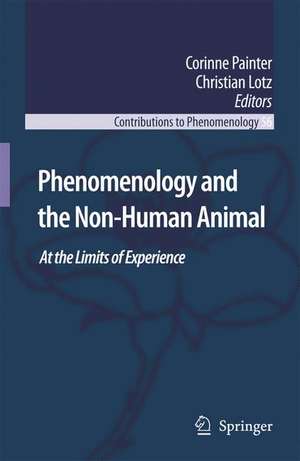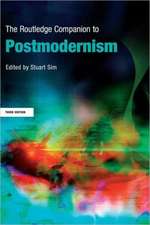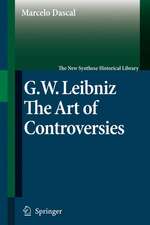Phenomenology and the Non-Human Animal: At the Limits of Experience: Contributions to Phenomenology, cartea 56
Editat de Corinne Painter, Christian Lotzen Limba Engleză Hardback – 4 sep 2007
| Toate formatele și edițiile | Preț | Express |
|---|---|---|
| Paperback (1) | 884.38 lei 6-8 săpt. | |
| SPRINGER NETHERLANDS – 20 noi 2010 | 884.38 lei 6-8 săpt. | |
| Hardback (1) | 890.37 lei 6-8 săpt. | |
| SPRINGER NETHERLANDS – 4 sep 2007 | 890.37 lei 6-8 săpt. |
Din seria Contributions to Phenomenology
- 20%
 Preț: 630.92 lei
Preț: 630.92 lei - 20%
 Preț: 693.49 lei
Preț: 693.49 lei - 18%
 Preț: 989.80 lei
Preț: 989.80 lei - 18%
 Preț: 1230.03 lei
Preț: 1230.03 lei - 15%
 Preț: 645.79 lei
Preț: 645.79 lei - 15%
 Preț: 657.39 lei
Preț: 657.39 lei - 18%
 Preț: 728.28 lei
Preț: 728.28 lei - 15%
 Preț: 635.96 lei
Preț: 635.96 lei - 15%
 Preț: 578.87 lei
Preț: 578.87 lei - 15%
 Preț: 638.43 lei
Preț: 638.43 lei - 15%
 Preț: 691.59 lei
Preț: 691.59 lei - 20%
 Preț: 505.32 lei
Preț: 505.32 lei - 15%
 Preț: 645.28 lei
Preț: 645.28 lei - 15%
 Preț: 637.28 lei
Preț: 637.28 lei - 18%
 Preț: 951.91 lei
Preț: 951.91 lei - 15%
 Preț: 634.00 lei
Preț: 634.00 lei - 15%
 Preț: 646.75 lei
Preț: 646.75 lei - 18%
 Preț: 727.97 lei
Preț: 727.97 lei - 15%
 Preț: 693.71 lei
Preț: 693.71 lei - 18%
 Preț: 729.06 lei
Preț: 729.06 lei - 15%
 Preț: 692.56 lei
Preț: 692.56 lei - 18%
 Preț: 778.94 lei
Preț: 778.94 lei - 18%
 Preț: 780.68 lei
Preț: 780.68 lei - 15%
 Preț: 646.62 lei
Preț: 646.62 lei - 18%
 Preț: 1231.47 lei
Preț: 1231.47 lei - 18%
 Preț: 730.35 lei
Preț: 730.35 lei - 18%
 Preț: 784.61 lei
Preț: 784.61 lei -
 Preț: 358.79 lei
Preț: 358.79 lei
Preț: 890.37 lei
Preț vechi: 1085.82 lei
-18% Nou
Puncte Express: 1336
Preț estimativ în valută:
170.39€ • 176.81$ • 142.42£
170.39€ • 176.81$ • 142.42£
Carte tipărită la comandă
Livrare economică 17-31 martie
Preluare comenzi: 021 569.72.76
Specificații
ISBN-13: 9781402063060
ISBN-10: 1402063067
Pagini: 155
Ilustrații: IX, 158 p.
Dimensiuni: 155 x 235 x 11 mm
Greutate: 0.43 kg
Ediția:2007
Editura: SPRINGER NETHERLANDS
Colecția Springer
Seria Contributions to Phenomenology
Locul publicării:Dordrecht, Netherlands
ISBN-10: 1402063067
Pagini: 155
Ilustrații: IX, 158 p.
Dimensiuni: 155 x 235 x 11 mm
Greutate: 0.43 kg
Ediția:2007
Editura: SPRINGER NETHERLANDS
Colecția Springer
Seria Contributions to Phenomenology
Locul publicării:Dordrecht, Netherlands
Public țintă
ResearchCuprins
Introduction: Phenomenology and the Question of the Non-Human Animal; C.Painter, C. Lotz. Section I: Phenomenology, Ontology, and Anthropology. 1.1 Attunement, Deprivation, and Drive: Heidegger and Animality; G. Kuperus. 1.2 Being Beyond: Aristotle’s and Plessner’s Accounts of Animal Responsiveness; M. Oele. 1.3 How Not to be a Jellyfish: Human Exceptionalism and the Ontology of Reflection; T. Toadvine. Section II: Phenomenology, Psychology, and Language. 2.1 How Do Primates Think? Phenomenological Analyses of Non-Language Systems of Representation in Higher Primates and Humans; D. Lohmar.2.2 Phenomenology and the Study of Animal Behavior; E. Ruonakoski. Section III: Phenomenology and Ethics. 3.1 The Intentionality and Animal Heritage of Moral Experience: What We Can Learn from Dogs about Moral Theory; C.S. Brown.3.2 Appropriating the Philosophies of Edmund Husserl and Edith Stein: Animal Psyche, Empathy, and Moral Subjectivity; C. Painter. Section IV: At the Margins of Phenomenology. 4.1 The Human as Just an Other Animal: Madness, Disability, and Foucault’s Bestiary; L. Carlson.4.2 The Intertwining of Incommensurables: Yann Martel’s Life of Pi; J. Mensch.
Caracteristici
Offers new perspectives on the human – non-human animal relationship Offers unique treatment of classical, systematic and ethical questions Includes new empirical research in psychology














